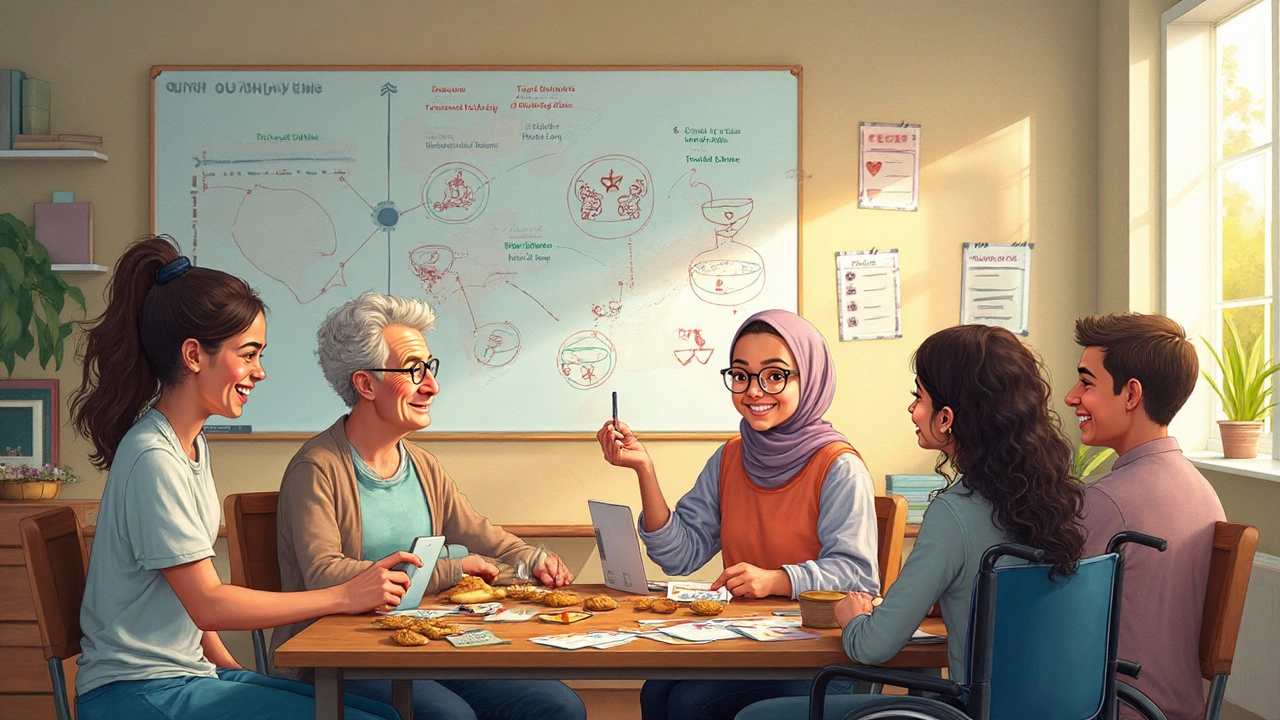Best Mental Health Charities in 2025: How to Choose and Where to Give (UK & Global)
 Sep, 7 2025
Sep, 7 2025
You want your donation to actually help someone feel safer, calmer, or connected. Fair. Is there one “best” mental health charity? Not really. Different charities solve different parts of the problem-crisis, therapy access, prevention, research, policy. The right pick depends on what impact you want and where. Here’s a clear way to choose without second-guessing yourself.
- There isn’t a single winner; match your gift to your goal: crisis help, therapy access, prevention, research, or advocacy.
- UK quick picks: Samaritans or Shout for immediate support; Mind/SAMH for services; YoungMinds for youth; MQ for research.
- Global, evidence-heavy option: StrongMinds (group therapy for depression in Africa) is backed by independent evaluators.
- Do a quick check: registration (Charity Commission/OSCR), recent annual report, clear outcomes, safeguarding, reserves policy.
- Boost your gift: turn on Gift Aid (adds 25% in the UK), ask about employer matching, consider monthly giving.
How to choose the best mental health charity for your goal
Here’s the honest truth: there is no universal list of best mental health charities that fits every donor. What works depends on what “impact” means to you. Start by answering three questions.
- What outcome do you want? Examples: fewer suicides tonight; shorter waiting lists for talking therapies; better school support; stronger evidence for what works; policy change; services in your area.
- Where do you want the impact? Local (your town or Scotland/UK), national, or global.
- How soon do you want results? Now (crisis lines), near-term (counselling access, school services), or long-term (research and policy).
Once you’ve got your answers, use these practical decision factors to narrow it down.
- Fit to your outcome: A crisis line is great for someone in distress at 2 a.m., not for building a therapy workforce. A research funder won’t deliver support tonight, but can change outcomes for years.
- Evidence and transparency: Look for numbers that matter-contacts answered, response times, therapy completion rates, relapse reduction, school attendance changes, suicide prevention outcomes. Read the latest annual report and audited accounts.
- Capacity to use more funding: Does the charity say how extra money will be used this year (e.g., “expand text volunteers by 15%,” “add counsellors in 10 schools”)?
- Safeguarding and quality: Crisis and youth work need strong safeguarding, robust training, and supervision. Check policies in their report.
- Local relevance and equity: If you care about underserved groups (e.g., Black communities, LGBTQ+ youth, severe mental illness), pick a charity working directly with them.
- Independence of evaluation: Bonus points for independent evaluations or participation in national datasets.
Due diligence you can do in 15 minutes (UK):
- Registration: Check the Charity Commission for England and Wales or OSCR (Scotland). Confirm registration number and trustees.
- Latest annual report: Scan the most recent year (2024/25 if published). Look for outcomes, not just activities.
- Money basics: Are finances stable? Reasonable reserves (not zero, not years’ worth). Clear plans for this year’s spend.
- Safeguarding note: Especially for helplines and youth services. Look for training, supervision, and incident reporting processes.
- Impact measures: What changes for beneficiaries? Short wait times, reduced distress scores, school retention-anything beyond “number of leaflets.”
UK giving tips that multiply impact:
- Gift Aid: If you pay UK tax, tick Gift Aid. It adds 25p per £1-at no extra cost to you.
- Employer match: Many companies match 1:1 (sometimes 2:1). Ask HR or check your benefits portal.
- Payroll giving: Donating from gross pay can be tax-efficient and simple to sustain.
- Unrestricted vs restricted: Unrestricted gifts give charities flexibility to put money where it’s most needed. Only restrict if you’re confident you understand delivery costs and timelines.
- Monthly vs one-off: Monthly helps charities plan services and keep lines staffed; one-offs are great for piloting and emergencies. Both are valid.
Common pitfalls to avoid:
- Overhead obsession: Low admin isn’t automatically good. Quality safeguarding, supervision, and data systems cost money and save lives.
- Chasing brand alone: Glossy campaigns can be great, but still confirm outcomes and capacity.
- Copying someone else’s pick: Your goal might differ from your friend’s. Use the scenarios below to find your fit.

Top mental health charities compared (UK focus, with credible global options)
I’ve focused on charities with clear missions, public reporting, and strong reputations in 2025. This mix covers crisis support, services, prevention, policy, and research. “Best for” depends on your goal-use the notes and scenarios to choose.
| Charity | Main focus | Region | Impact signals | Best for | Not for |
|---|---|---|---|---|---|
| Samaritans | 24/7 emotional support (listening) | UK & Ireland | High call/text volume; volunteer training; rapid access | Immediate support tonight | Therapy or medical emergencies |
| Shout (85258) | 24/7 text support | UK | Fast, anonymous SMS; strong data reporting | Quiet, discreet crisis help | Ongoing therapy |
| Mind | Local services, info, advocacy | England & Wales | Network of local Minds; service outcomes in reports | Community services & advice | 24/7 crisis line |
| SAMH | Services, policy, campaigns | Scotland | Scottish programmes; policy wins; service KPIs | Impact in Scotland | Outside Scotland |
| Rethink Mental Illness | Severe mental illness support & advocacy | England | Carer support, housing, advice metrics | Schizophrenia, bipolar, carers | Crisis listening line |
| YoungMinds | Youth mental health advocacy & parent helpline | UK | Policy influence; parent support outcomes | Children & families | Clinical therapy at scale |
| Place2Be | School-based counselling | UK | Attendance/behaviour improvements; trained counsellors | Support in schools | Out-of-school crisis |
| CALM | Suicide prevention for men; campaigns; helpline | UK | Helpline/chat coverage; campaign reach | Male suicide prevention | Clinical treatment |
| PAPYRUS | Young suicide prevention (HOPELINE247) | UK | Specialist youth support; safety planning | Under-35s in crisis | Adult therapy |
| Mental Health Foundation | Research, prevention, policy | UK | Evidence-led programmes; policy briefs | Prevention & policy change | Immediate crisis support |
| MQ Mental Health Research | Research funding | UK/global | Peer-reviewed grants; translational focus | Long-term breakthroughs | Direct services now |
| Black Minds Matter UK | Free therapy for Black people | UK | Therapy placements; wait-time transparency | Equity and access | Research/policy work |
| Anxiety UK | Condition-specific support | UK | Therapy access schemes; resources | Anxiety/Panic/OCD support | General crisis line |
| Beat | Eating disorder support & advocacy | UK | Helpline; carer training; outcome reporting | Eating disorders | Broad mental health focus |
| StrongMinds | Group therapy for depression (women & youth) | Africa | Independent evaluations; cost-effective outcomes | Evidence-led global impact | UK-local services |
| NAMI | Education & advocacy | USA | Community programs; policy influence | US-focused advocacy | UK services |
| The Trevor Project | Crisis support for LGBTQ+ youth | USA (global resources) | 24/7 crisis services; research | LGBTQ+ youth safety | Adult services |
Notes to help you pick fast:
- Samaritans - Best if you want someone in distress heard tonight. Not therapy, not medical advice.
- Shout - Same “now” impact but via text. Good for privacy or when speaking is hard.
- Mind / SAMH - Strong choice for local services, advocacy, and advice. Check your local branch for programmes and outcomes.
- YoungMinds / Place2Be - If you care about children and teens. YoungMinds steers policy/parents; Place2Be delivers counselling in schools.
- PAPYRUS / CALM - Focused suicide prevention. PAPYRUS is youth-specific; CALM has a strong reach to men and powerful campaigns.
- Mental Health Foundation / MQ - If you want long-run change. MHF leans prevention and policy; MQ funds research you can track.
- Black Minds Matter UK - Funds therapy for Black people facing barriers in access. Practical, targeted, and transparent about waitlists.
- StrongMinds - For donors who want high “impact per £” supported by independent evaluators (e.g., Happier Lives Institute, Founders Pledge assessments). Not UK-local.
Why these? All of the above publish impact or activity data, have strong reputations, and focus on outcomes that map to common donor goals. For risk and quality, crisis and youth providers typically show training, supervision, and safeguarding in annual reports. For research, look for peer review and lay summaries. For services, look at wait times, completion rates, and follow-up outcomes.

Which one is “best” for you? Scenarios, trade-offs, and next steps
Use these quick scenarios to match your goal to a charity in under two minutes.
- I want my £50 to help someone tonight. Pick: Samaritans or Shout. Why: Immediate access. Trade-off: Not therapy.
- I want better support in Scottish communities. Pick: SAMH. Why: Scotland-first services and policy. Trade-off: Less impact outside Scotland.
- I care most about young people in schools. Pick: Place2Be (delivery) or YoungMinds (policy/parent support). Trade-off: School-term dependent reach vs policy timelines.
- I want to back suicide prevention. Pick: PAPYRUS (youth) or CALM (men). Trade-off: Specialised, not broad mental health.
- I want measurable, cost-effective mental health impact. Pick: StrongMinds. Trade-off: Global, not UK.
- I want long-term breakthroughs. Pick: MQ Mental Health Research. Trade-off: Impact is slower and probabilistic.
- I want to improve life for people with severe mental illness and their carers. Pick: Rethink Mental Illness. Trade-off: Less focus on mild/moderate conditions.
- I want to reduce anxiety-related suffering. Pick: Anxiety UK (or condition-specific groups like OCD-UK). Trade-off: Narrower scope.
- I want mental health prevention at scale. Pick: Mental Health Foundation. Trade-off: Systems and policy work take time to show results.
A fast, safe decision flow:
- Choose your outcome: crisis now, services this year, or research/policy for future change.
- Pick a region: UK local vs global.
- Select a match from the scenarios above.
- Do a 15-minute due diligence check (registration, annual report, outcomes).
- Switch on Gift Aid, set up monthly (if you can), and ask your employer to match.
How to vet a smaller local mental health charity (if your heart is set on your city/town):
- Check registration with OSCR or the Charity Commission and scan trustee names.
- Read the latest annual report: do they measure change, not just activity?
- Look for clinical supervision if they deliver counselling.
- Email to ask: “If you had an extra £5,000 this quarter, what would you do?” You want a clear, plausible, near-term answer.
Ways to give beyond money:
- Volunteer: Samaritans, Shout, CALM, PAPYRUS, and many local Minds train volunteers. You’ll need time for training and supervision.
- Skills-based help: Offer design, data, copy, or translation. Many charities need these more than another leaflet drop.
- Peer fundraising: Parkrun challenge, book club read-a-thon, or a matched-birthday fundraiser.
Trade-offs to keep in mind:
- Now vs later: Crisis lines deliver immediate relief; research changes the system over years. Both matter-just pick your lane.
- Depth vs breadth: Therapy for fewer people vs short contacts for many. Decide what feels right to you.
- Local pride vs global scale: UK services connect to your community; global programmes can be more cost-effective per outcome.
Mini‑FAQ
- Is “overhead” a red flag? Not by itself. Good helplines and therapy services need training, supervision, safeguarding, and tech. Look at outcomes and quality, not just admin ratios.
- Is monthly giving better? It helps charities plan staffing and reduce wait times. If cash flow is tight for you, a one-off is still helpful-just turn on Gift Aid.
- How do I avoid scams? Use official registers (OSCR or Charity Commission), avoid pressure tactics, and donate via the charity’s own website or known platforms. For US charities, check IRS 990 filings and independent ratings.
- Can I see impact data? Yes. Check annual reports for response times, outcomes (distress scale shifts, therapy completion, school metrics), and independent evaluations when available.
- What if I can’t choose? Split your gift: 50% to immediate support (Samaritans/Shout), 50% to prevention/research (Mental Health Foundation/MQ). That balances now and later.
Credibility notes
- Registration: Charity Commission for England and Wales, and OSCR for Scotland, hold official records. Review annual reports and audited accounts there.
- Evidence: Independent groups like the Happier Lives Institute and Founders Pledge have assessed StrongMinds’ cost-effectiveness for depression in low‑income settings. UK clinical and service guidelines (e.g., NICE) frame quality standards for treatment access; charities often align with these in practice.
- US context: Form 990 filings and independent raters (e.g., Charity Navigator) support transparency checks for US-based charities like NAMI and The Trevor Project.
Next steps
- Pick your goal: “help tonight,” “expand services,” or “build future solutions.”
- Choose a charity from the scenarios and table.
- Do the 15-minute check (register, report, outcomes, safeguarding).
- Donate with Gift Aid, set monthly if possible, and request employer match.
- Calendar a 12‑month review: read next year’s report, and adjust your giving.
Troubleshooting by persona
- Time-poor donor: Give to Samaritans or Shout for immediate impact, plus MQ for long-term. Set up two small monthlies. Done in 10 minutes.
- Analytical donor: Read StrongMinds’ evaluation summaries; pair with Mental Health Foundation for prevention. Email one UK service provider for their wait-time stats before donating.
- Employer/HR lead: Offer payroll giving and matching. Suggest Shout or Samaritans for crisis, plus a youth option (YoungMinds) for family relevance.
- Student group: Fundraise for PAPYRUS or CALM, and invite a speaker on suicide prevention. Combine money raised with a peer-support training session.
- Community organiser in Scotland: Back SAMH for local programmes and policy. Ask your local authority about co-funding opportunities.
Final thought: you don’t need the “perfect” pick to make a real difference. A well-matched, properly checked charity can turn your £10, £50, or £500 into fewer lonely nights and more people getting the help they need. That’s the outcome that counts.
